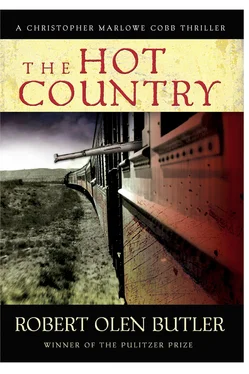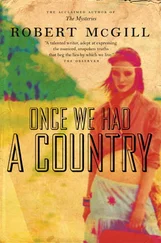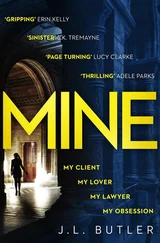But the door was not opening.
The sound once more: a scuttling along the floor, and then silence. A rat. A different rat from the one I was expecting.
I lowered my arm.
I put my pistol in its holster.
I bent once again to the portfolio and thrust my right hand deep inside and I buttoned first the one side of the inner flap and then the other.
I picked up the stack of objects from that side of the bag. I slipped them in as I’d found them. The shirts and the socks and the riding breeches and the silk drawers and the knife in their midst. The soaps. And then the other side. The linen suit. The shoes. The clothes brush. All the rest. All of it went in as it had come out and I secured the outer flaps of the saddlebags.
I turned down the wick on the lamp, angled a hand over the top of the chimney, and I blew out the light. I picked up the saddlebags.
I turned toward the front of the caboose and walked into the darkness there. The glow of a hundred campfires outside showed me the shape of the stove, and I returned the saddlebags to the space behind exactly as I’d found them. I stepped farther on to the door that adjoined the next car, a boxcar. The door was, as I suspected, locked. I was quite calm. I turned and I walked to the rear door and I opened it.
The back platform was empty. I stepped out, closed the door. Mensinger likely would approach from the same side of the train I’d earlier walked along, the side where he’d dismounted from his horse. I could go down the steps to the other side of the train. But I knew where I wanted to go next. And I was not afraid of Mensinger. I wouldn’t be in Villa’s camp for long. I had what I needed for the story.
But I did take off my sombrero so I could peek around the corner of the car. There would still be some inconvenience in running into him in the next few moments.
I looked. It was dark but I could see from the desert glow of campfires that he was not in the immediate vicinity. I went down the steps, put my sombrero on, and strode off toward the forward trains.
I walked perhaps a dozen boxcars along and I saw him approaching on foot. He was still fifty yards away and he was looking at me, I thought, but I simply let my head fall slightly forward. The brim of the sombrero made him vanish, made my face disappear from his sight. It was dark. I could not see any details of his face. So he could not clearly identify mine, especially when he knew my face only as a Canadian coffee salesman and the rest of what he saw was so wildly out of context with that.
I made myself stumble a bit, stagger a bit, and I cursed in Spanish, pitching my voice high, putting on just enough of a tinge of the melodrama-Mexican to still stay real but to make my voice unrecognizable as the voice from the station in Mexico City. I sang a little: “ Ay, ay, ay, ay, Canta y no llores . .” Enough for him to hear, and I broke off, as if I could not remember the words. And I saw his high-booted legs, his puttees, and though he slowed — he did slow down — nevertheless he was passing. And I saw the British cavalry sword that had been on Villa’s desk. It was hanging now at Mensinger’s side. A gift for the German government representative. And Mensinger passed, and I kept going, staggering ever so slightly once more. “ Ay, ay, ay, ay, ” I sang.
I reached the postal car and I stopped. I walked this far expecting to walk on past. To find Señora Toba-Rojas. To find Luisa. But things had changed. I had my story. I could saddle up right now. I had a map. I had a compass. It would take me five minutes to figure out what the smart destination would be. An American border town, certainly. Just which one? Somehow I got the inkling it’d be good to get on the road as soon as possible. But I had some long riding ahead of me and some serious times just behind. I was weary. I wanted to spend a night on bedding, even in a postal car like a bag of mail. And there was Luisa. This would likely be my last chance to speak to her. If she was here at all. And after what Villa said, part of me hoped she wasn’t here and never was. I walked on.
The wide, center door of the boxcar was open. Against the left-hand jamb sat two heavyset women, side by side, quietly watching the night, gently swinging their legs. They turned their faces to me.
“Are either of you Señora Toba-Rojas?” I asked.
They said no.
“Is she here?” I asked.
One of them angled her head toward the darkness inside the car.
The two resumed their quiet watching.
I stepped to the empty part of the open doorway. Dimly I was aware of faces inside. And in a far corner, a low-burning lamp with shapes beside it. And I was filled with the smell of straw and of borax and a mix of flowery cheap perfumes and, underneath it all, the smell of bodies, but with that special musky undercurrent of women’s bodies. Even without the added scent of greasepaint and cold cream, the women’s bodies carried me out of the dark of a Mexican night and into the doorways of countless actresses’ dressing rooms in the countless theaters of my boyhood and young adulthood and young manhood.
But I returned from there quickly and I was standing before the boxcar door and I called out, “Señora Toba-Rojas.”
Nothing.
As softly as I could and yet be heard, I said, “May I speak with you, Señora Toba-Rojas? I am just arrived with Hernando Soto and we have been with our jefe and he said I might inquire with you after a woman.”
And I drew back. In absolute silence she appeared massively before me, emerging from the dark but with no sound at all that I’d heard, no scuffling, no rustling.
“Señora,” I said. “Thank you.”
Now I could hear that she was real, as she scraped and sighed a bit in bringing her heavy body down to sit at the edge of the doorway, letting her legs dangle like the other two women. She smoothed her skirts. She looked at my face, though my back was to the fires and I was sure my sombrero cast an even deeper shadow.
I lifted my hand and removed my sombrero.
She straightened a bit, unaware until now, I thought, that I was not Mexican.
I said, “I’m looking for a woman who has arrived within the last week or so. She was known in Vera Cruz as Luisa Morales.”
The señora did not answer. Perhaps she was considering if there was such a woman.
“She is a wonderful shot with a rifle,” I said.
The señora said, “ Jefe sent you to me?”
“Do I look like I could find you on my own?”
She smiled at this.
She said, “You spoke Hernando Soto’s name.”
“I have ridden with him,” I said. I lifted my left shoulder a bit to draw her eyes to my bandaged arm.
She nodded.
Between the postal car and this place where I was standing, I’d removed a gold quarter-eagle coin from my money belt. It was in my pocket. It might be time.
She said, “Would you want this girl as Hernando Soto would?”
“I only ask to speak with her,” I said.
She considered this, looking at me carefully.
I said, “If I were to offer you some token for your trouble, you must understand it is not an attempt to buy Luisa Morales. It is simply a gift to you. I will treat her with respect.”
At this, the señora slowly lowered her face, keeping her eyes fixed on mine as she did, stopping only when she would have had to let go of our gaze. Perhaps there was, in this gesture, a sense of disbelief. But it felt like more than that. It felt as if she was also saying: It is too late for respect. She has lost that in a terrible way already. No woman here has this thing.
I withdrew the gold coin from my pocket and I brought my hand discreetly near hers, which lay on her leg just above the knee.
Читать дальше












